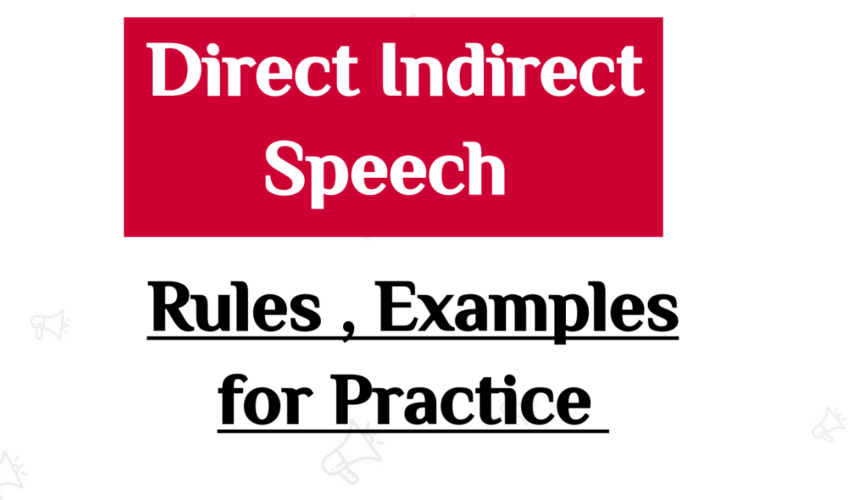The sentence, which bears inverted commas, is called direct speech.
- Direct Speech
- I
- We
- Us
- Me
- Our
- My
- Your
- You (First position)
- You (Last Position)
- This
- These
- Hence
- Ago
- Now
- Tonight
- Today
- Tomorrow
- Yesterday
- Did
- Could
- Simple past
- Come
- Was dancing
- Indirect Speech
- He/she
- They
- Them
- Him/her
- Their
- His/her
- His/her
- He/she
- Him/her
- That
- Those
- Thence
- Before
- Then
- That night
- That day
- The next day
- The day before
- Had
- Could have +pp
- Past perfect
- Go
- Had been dancing
A] For assertive sentence (Rule)
The sentence that makes a statement is called assertive or Declarative or Statement
Here are the rules for this type
Said = said
Said to = told
Says = says
Connective = that
For ex.
* He said, “I have told you about this.”
Ans: He said that he had told him about that.
* He said to him, “You have to listen me.”
Ans: He told him that he had to listen him.
* “I will not help you,” the teacher said to him.
Ans: The teacher told him that he would not help him.
* She said, “Honesty is the best policy.”
Ans: She said that honesty is the best policy.
(Universal truth should be kept in present tense)
* He said to me, “You are very punctual.”
Ans: He told me that I was very punctual.
Examples for practice:
1] He said to his father, “I will work hard this year.”
2] She said to his friend, “We have to listen to our parents.”
3] The principal said, “I will not forgive you next year.”
4] The students said to the principal, “We are very sorry for this mistake.”
5] “You are very cunning,” she said to her friend.
6] The teacher said to his pupils, “This is the most important year for you.”
7] The pupils said to the teacher, “We will be extremely careful about this,”
8] I said to my sister, “You have to listen my advice.”
9] He said, “Man is mortal.”
10] He proved, “The earth is round.”
11] The servant says, “Tea is ready.”
12] He said to his mother, “I am ill today and so I will not go to school.”
13] He said, “My pen is lost.”
14] He said to him, “I know you and your aunt.”
15] I said to the boys, “You should not your duty.”
16] He said to me, “You are very innocent.”
17] The teacher said, “I am busy now.”
18] You said to me, “I don’t think I can oblige you again in this way”
19] The teacher said to the girl, “You have to improve your study,”
20] He said to me, “I can easily beat you in the long jump.”
21] “I have acted foolishly,” Ali said, “but I am sorry for it.”
22] He replied. “You are quite mistake, I am working very hard.”
23] He said to us, “I advise you all to do your work regularly.”
24] I said,” I shall finish my work as quickly as I can.”
25] He said, “It may rain tomorrow.”
B] Interrogative sentence:
There are two types
A] Wh-? Type
B] Yes/No answer?
For Wh-? (Rule)
The questions that begins with wh word is called wh ? type
Said = asked
Said to = asked
Connective = the given wh-word
For ex :
* He said, “Why are you crying?”
Ans: He asked why he was crying.
* She said to me, “When will you return?”
Ans: She asked me when I would return.
* The teacher said, “What are you doing?”
Ans: The teacher asked what he was doing.
* “Why are you sad?” he said.
Ans: He asked why he was sad.
* He said to his friend, “Why did you insult my brother.”
Ans: He asked his friend why he had insulted his brother.
Examples for practice:-
1] He said, “Why are you so late?”
2] He said to him, “Why can’t you challenge me in wrestling?
3] She said to him, “Why can’t you help me?
4] He said to him, “Why are you dancing here?”
5] “When did you call me?” He said.
6] She said to her, “Why are you singing loudly?”
7] She said to her, “Why don’t you tell me?”
8] She said to him, “Who are you and why have your come here?”
9] The teacher said to him, “What is your problem?”
10] She said to the teacher, “How can I solve this problem?”
11] They said, “Why have your cheated us?”
12] She said to her mother, “Where are you going now?”
13] The old man said to the boys, “Why are you teasing me?”
14] She said to her, “What is this?”
15] They said to her, “Where have you kept the bag?”
16] She said to her, “Whom do you want?”
17] They said to the priest, “Why should we listen you?”
18] She said to her, “How long should we wait here?”
19] She said to her friend, “How are you?”
20] They said to him, “What can we do for you?”
YES/NO -? TYPE Rule:
The question that answers yes or no is called yes no question type
Said = asked
Said to = asked
Connective = if whether
For ex:
* He said, “May I come in?”
Ans: He asked if / whether he might come in.
* They said to him, “Is it fair?”
Ans: They asked him if it was fair
* “Do you like my gift?” he asked.
Ans: He asked if he liked his gift.
* They said to him, “Will you listen our speech?”
Ans: They asked him if he would listen their speech.
* He said to him, “Are you going to market?”
Ans: He asked him if he was going to market.
* He said to him, “Are you happy with me?”
Ans: He asked him if he was happy with him
Examples for practice:
1] They said to him, “Don’t you know about it?”
2] She said to her, “Have you completed you work?”
3] They said to him, “Do you think that we are wrong?”
4] The people said, “Can you take decision?”
5] The teacher said to them, “Haven’t I told you about this?”
6] He said to him, “Will you dance like me?”
7] They said to him, “Are you wise guy or something?”
8] She said to her friend, “Don’t you like our gift?”
9] They said to him, “Did you brush your hair this morning?”
10] My father said, “Have your finished your lesson, my boy?”
11] They said to him, “Will you lend us some money?”
12] The old man said to him, “May I help you in this case?”
13] The little girl, “Why are you angry with me?”
14] He said to him, “Do you hit this stroke?”
15] They said to him, “Can we you use your telephone?”
16] He said to him, “Don’t you know the rule?”
17] She said to him, “ Have you asked your parents?”
18] The doctor said angrily, “Don’t you know the bad effects of smoking?”
19] She said to him, “Do you know that I am in tense?”
20] He said, “ Have you seen my bag?”
C] Imperative Sentence:
The sentence that expresses order , request , advice is called as imperative sentence
Said /said to = ordered / requested/ commanded/advised/warned/asked ( according to expression)
connective
= to
Don’t = not to
For ex:-
1] He said to him, “Give me your pencil”
Ans: He asked him to give him his pencil.
2] She said to him, “Please, help me.”
Ans: She requested him to help her.
3] The inspector said to him, “Follow me.”
Ans: The inspector ordered him to follow him.
4] The teacher said to him, “Study regularly.”
Ans: The teacher advised him to study regularly.
5] He said to his son, “Don’t waste your time.”
Ans: He advised his son not to waste his time.
Examples for practice:
1] He said to him, “Give me your pencil.”
2] The teacher said to him, “Study regularly.”
3] The people said to him, “Try to understand me.”
4] He said to his Father, “Give me some money.”
5] The old man said, “Please, help me to cross the road.”
6] The little said to me, “Try to help me.”
7] They said, “Tell us the truth.”
8] He said to him, “Please take me into the forest with you.”
9] He said to him, “Look after our parents.”
10] The inspector said to the constable, “Follow me.”
11] The little girl said to him, “Be brave.”
12] He said to him, “Please, wait here till I return.”
13] He said to his servant, “Do as you are told.”
14] He said to his son, “Don’t waste your precious time.”
15] He said to me, “Hurry up.”
16] The teacher said, “Pay attention to your lesson and do not talk.”
17] The officer said to him, “Leave my office at once.”
18] He said to the king, “Please forgive me.”
19] He said to his friend, “Please tell me what time it is.”
D] Exclamatory sentence:
The sentence that expresses strong feelings is called exclamatory sentence
Rule:
said = exclaimed
Connective = that
N.B IN indirect narration the exclamatory sentence should be turned into assertive.
For ex.
1] He said, “How happy I am!”
Ans: He exclaimed that he was very happy.
2] She said, “How lazy you are!”
Ans: She exclaimed that he was very lazy
3] They said, “How dangerous it is!”
Ans: They exclaimed that it was very dangerous.
4] He said, “Wonderful!”
Ans: He exclaimed that it was very wonderful.
5] He said, “Alas! He is dead!”
Ans: He exclaimed sadly that he was dead.
Examples for practice:
1] They said, “How selfish you are!”
2] He said, “What a beautiful flower it is!”
3] She said, “How foolish I am!”
4] They said, “What luck!”
5] He said, “How nice it is!”
6] The poor man said, “How hungry I am!”
7] The people said, “What a great king he was!”
8] The teacher said, “How happy I am today.”
9] My father said, “How happy I am today.”
10] She said, “How kind you are!”
11] He said, “How kind you are!”
12] He said, “How innocent! You are!”
13] They said, “May god blesses you!”
14] He said, “Hurrah! He has passed.”
15] He said, “How tall I am!”
16] He said, “Raja, you are very lazy.”
17] They said, “Let’s complete the work”
18] He said, “Good bye friends.”
19] “What a terrible storm it is!” he said.
20] He said, “Thank god, I passed the exam.”









